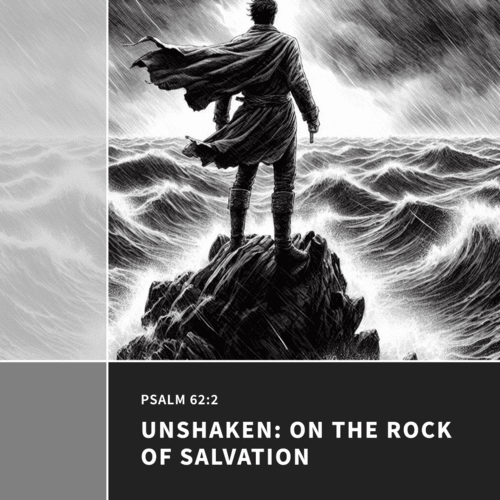Can We Be Saved If We’ve Never Evangelised?
The question haunts many a believer: “What if I die tonight? I’ve been a Christian for years, but I’ve never really shared my faith. Does God still accept me?” Perhaps we’ve wrestled with guilt over missed opportunities, fumbled conversations, or simply the overwhelming feeling that you’re not the evangelistic type. Well, let’s take heart—the gospel has better news for us than we might think…
THE UNSHAKEABLE FOUNDATION: SALVATION BY GRACE ALONE
Here’s the truth that transforms everything: our salvation has never depended on our evangelistic record. Scripture is crystal clear on this point. “For by grace you have been saved through faith. And this is not your own doing; it is the gift of God, not a result of works, so that no one may boast” (Ephesians 2:8-9). Paul’s words leave no wiggle room—salvation is God’s gift, not our achievement.
Consider what Christ declared from the cross: “It is finished” (John 19:30). Not “It will be finished when you evangelise enough people,” but completed, accomplished, done. When Jesus paid for our sins, He didn’t leave an outstanding balance for us to work off through witnessing. Romans 3:28 confirms this: “We hold that one is justified by faith apart from works of the law”—and evangelism, however good and necessary, remains a work.
This isn’t just theory. Romans 8:29-30 presents what theologians call the “golden chain” of salvation: “For those whom he foreknew he also predestined to be conformed to the image of his Son… And those whom he predestined he also called, and those whom he called he also justified, and those whom he justified he also glorified.” Notice what’s missing? Any mention of evangelistic performance. God’s sovereign grace carries us from predestination to glorification, and He who began this good work in us will complete it (Philippians 1:6).
UNDERSTANDING THE RELATIONSHIP BETWEEN FAITH AND WORKS
But doesn’t James say faith without works is dead? Absolutely—and this actually supports our point. Works, including evangelism, flow from salvation rather than producing it. Ephesians 2:10 explains the proper order: “We are his workmanship, created in Christ Jesus for good works.” First creation in Christ, then good works. The tree produces fruit; the fruit doesn’t produce the tree.
The Holy Spirit produces fruit in believers’ lives (Galatians 5:22-23), but not every believer bears identical fruit. Just as the body of Christ has many members with different functions (1 Corinthians 12:4-7), not everyone is called to be an evangelist in the formal sense. Some are teachers, others serve, still others encourage. God’s kingdom advances through diverse gifts, not a one-size-fits-all evangelistic template.
CAN WE BE SAVED IF WE’VE NEVER EVANGELISED? BIBLICAL EXAMPLES
Scripture provides compelling examples of salvation apart from evangelistic activity. The thief on the cross (Luke 23:39-43) believed in his final moments and heard Christ’s promise: “Today you will be with me in paradise.” He had no opportunity to share his faith, build relationships, or attend evangelism training. Yet Jesus declared him saved based solely on faith.
Consider the heroes of faith in Hebrews 11. Many lived and died without engaging in what we’d recognise as evangelism. Abraham, “the father of faith,” was justified by believing God’s promise (Romans 4), not by his witnessing efforts. The Old Testament saints trusted God’s revelation available to them and were credited with righteousness—period.
THE NATURAL EXPRESSION OF FAITH
Here’s where Romans 10:9 becomes crucial: “If you confess with your mouth that Jesus is Lord and believe in your heart that God raised him from the dead, you will be saved.” Notice confession does accompany belief—not as a work that saves, but as faith’s natural expression. True faith seeks to declare itself, just as a river naturally flows downhill.
This doesn’t mean every believer becomes a street preacher or overseas missionary. But genuine faith does long to express itself somehow, somewhere, to someone. The woman at the well couldn’t help but tell her town about Jesus (John 4:28-30). The disciples, despite their fears, couldn’t stop speaking about what they’d seen and heard (Acts 4:20). Faith has a voice—sometimes quiet, sometimes bold, but real nonetheless.
EVANGELISING: IT’S NEVER TOO LATE TO BEGIN
If we’ve been silent about our faith, here’s the beautiful truth: it’s never too late to start. God provides opportunities and strength for witness at every stage of life. Our unique circle of relationships—family, friends, coworkers, neighbours—represents a mission field no one else can reach quite like we can. If we don’t share Christ with them, who will?
This isn’t meant to burden us with guilt, but to inspire hope. God has sovereignly placed us in specific relationships for His purposes (Acts 17:26-27). The Ezekiel 3:18-19 principle reminds us faithful witness, regardless of results, brings peace to our conscience and honour to God.
CAN WE BE SAVED IF WE’VE NEVER EVANGELISED? LIVING IN GOSPEL FREEDOM
Our salvation rests secure in Christ’s finished work, and not on our evangelistic performance. But precisely because we’re saved by grace, we’re free to witness from love rather than law, from gratitude rather than guilt. There’s no condemnation for those in Christ Jesus (Romans 8:1)—whether we’ve shared our faith with thousands or struggled to speak up even once.
Let’s take the pressure off ourselves. Trust the Holy Spirit to provide opportunities, words, and courage. Our unique story, relationships, and personality are tools in God’s hands. He’s not asking us to be someone else—He’s asking us to be faithfully, prayerfully ourselves.
The gospel that saved us by grace alone is the same gospel that empowers us to witness by grace alone. May we rest in that truth, and let it transform both our assurance and our witness.
CAN WE BE SAVED IF WE’VE NEVER EVANGELISED? RELATED FAQs
Can we be saved if we’ve never evangelised? What do Reformed leaders say? John Piper emphasises that while salvation is by faith alone, genuine faith will inevitably produce some form of witness, even if not formal evangelism. RC Sproul consistently taught justification is by faith alone but that justified faith is never alone—it produces fruit, though not every believer is called to be an evangelist. Both affirm salvation security doesn’t depend on evangelistic performance while encouraging believers to grow in their witness as part of their sanctification.
- Does the Great Commission (Matthew 28:19-20) make evangelism mandatory for all Christians? The Great Commission is given to the church corporately, not necessarily requiring every individual believer to be a cross-cultural evangelist. Reformed theologians distinguish between the church’s collective responsibility and individual calling within the body of Christ. While all believers should be ready to give a reason for their hope (1 Peter 3:15), the Spirit distributes different gifts—some are called specifically as evangelists (Ephesians 4:11), while others serve the evangelistic mission through prayer, giving, hospitality, or other supporting roles.
- What about “lifestyle evangelism” versus verbal proclamation—is silent witness enough? Contemporary Reformed thought generally holds that while godly living is essential and often opens doors for gospel conversations, salvation requires hearing and believing the gospel message (Romans 10:14-17). Francis Schaeffer emphasised Christians should live in such a way that others ask questions, creating opportunities for verbal witness. Most Reformed leaders today argue lifestyle alone, while important, cannot replace the need for clear gospel proclamation at some point in the evangelistic process.
- How do Reformed theologians handle Jesus’ words about being “ashamed” of Him (Mark 8:38)? Reformed scholars like John MacArthur and Sinclair Ferguson interpret Christ’s warning about being “ashamed” as referring to apostasy or false profession rather than temporary weakness in witness among genuine believers. They point to Peter’s denial followed by restoration as evidence that momentary failures in witness don’t negate salvation. The context suggests Jesus is warning against total rejection of Him and His message, not occasional evangelistic timidity among true believers.
How do churches handle believers with social anxiety, autism, or other conditions that make traditional evangelism difficult? Modern Reformed pastoral theology, influenced by leaders like David Powlison and the biblical counselling movement, recognises that different believers have varying capacities for verbal witness due to personality, mental health, or neurological factors. These churches emphasise that God uses the whole body, including those who serve through prayer, financial support, acts of service, or creating welcoming environments. The key is faithful stewardship of whatever opportunities and abilities God provides, not conforming to a single evangelistic model.
CAN WE BE SAVED IF WE’VE NEVER EVANGELISED? OUR RELATED POSTS
Editor's Pick

What Makes a Godly Mom? A Scripture-Backed Guide
In our culture’s confusion about gender roles and parenting, the timeless question remains: what makes a godly mother? While secular [...]

Paul’s Mandate for Men: Headship Or Servant Leadership? Or Both?
Modern Christianity has fallen into a trap. We've created an either/or battle between "headship" and "servant leadership," as if these [...]

Should We Stop Using Male Pronouns for God? Why Do We Say No?
A friend of ours arrived eagerly at his first theology class in seminary. But he quickly discovered something troubling: the [...]

Did Old Testament Law Force Women to Marry their Rapists?
**Editor’s Note: This post is part of our series, ‘Satan’s Lies: Common Deceptions in the Church Today’… Viral misinformation abounds [...]

From Danvers To Nashville: Two Statements, One Biblical Vision
30 years separate the Danvers Statement on Biblical Manhood and Womanhood (1987) and the Nashville Statement on Human Sexuality (2017). [...]

The Nashville Statement: Why Affirm It Despite Media Backlash?
WHY DO REFORMED CHRISTIANS STAND BY THIS STATEMENT ON MARRIAGE AND GENDER? When the Nashville Statement was released in 2017, [...]

Who Is Belial? Solving The 2 Corinthians 6:15 Mystery
Belial: This name from the pages of Scripture chills the soul. Who is this mysterious figure Paul invokes in 2 [...]

Celibacy Or Castration: What Jesus Really Means in Matthew 19:12
One of Scripture's most shocking misinterpretations led theologian Origen to castrate himself in the third century. His tragic mistake? Taking [...]

Philippians 4:13: Did Paul Really Mean We Can Do ALL Things?
"I can do all things through Christ who strengthens me." It's on gym walls, graduation cards, and motivational posters everywhere. [...]

The Ordinary Means of Grace: Why Are They Indispensable?
ORDINARY MEANS FOR EXTRAORDINARY TRANSFORMATION What if God's most powerful work in believers' lives happens through the most ordinary activities? [...]
SUPPORT US:
Feel the Holy Spirit's gentle nudge to partner with us?
Donate Online:
Account Name: TRUTHS TO DIE FOR FOUNDATION
Account Number: 10243565459
Bank IFSC: IDFB0043391
Bank Name: IDFC FIRST BANK






